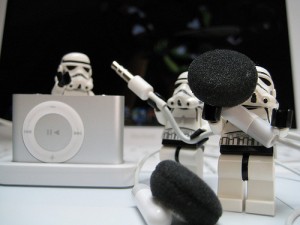By Wendi E. Berry

On Feb. 23, my advanced academic writing students from the School of Professional and Continuing Studies confronted their iPods. After blogging as a prewrite and writing their critiques—in this case 600-word reviews of movies or TV episodes—they scaled what they’d written down to 300 words and prepared to tape their voices. They’d already been reading sections of their papers aloud each week in class in order to slow down, hear where they faltered, and find what worked and what needed to be re-structured and re-worded. Now they faced this new prospect. Their voices would be taped and they would listen to the recordings with their classmates. This is what petrified them the most.
One of my students, Janice, in reflecting on that initial fear wrote, “I liked listening … even when [classmates] did not enjoy listening to their own. It seems as if all of us felt the same way, although after the first listen, we seemed to get over the initial feelings of dread at hearing our own voices.”
Another student Seth admitted “when we listened to my recording in class I could not hold my head up, even though I heard the class making positive remarks.”
An interesting thing happened during recording, and then later as they heard as each other’s podcasts. Students became more aware of audience and the effect that had on revision. For Deborah, the rhetorical situation became real. In a reflective cover letter, she confided, “I was horrified at the thought of my fellow students listening to me ramble over grammatical errors and stumbling over misplaced words. I instantly began revising my paper, as well as practicing how I would say the words.”
Seth acknowledged that before this assignment revision was usually “a one-time read over and making some minor grammar corrections.” When he taped his voice with the iPod, he found that he paused often to make more precise word choices and to vary his sentence length. The biggest change was a global overhaul to the structure and moving paragraphs around to ensure his message was being heard the way he intended it.
He noted that “being able to listen to my classmates was a big help. This gave me an opportunity to compare and contrast my recording to theirs. From listening, I noticed they had sufficient details which I lacked in the beginning.”
Another student Ryan became “obsessed” with the clarity of the writing. “I spent a good amount of time choosing descriptive words such as ‘greasy,’ and ‘rusting,’” he wrote in his letter about the experience.
While not all students would say the assignment was enjoyable, most thought it was worthwhile. My class had the good fortune of being able to visit the Technology Learning Center (TLC) and get help from student consultants with uploading files onto Blackboard. One cable was not the right kind, but other than quickly switching cables, uploading was not an issue. What’s the next pedagogical step for student podcasting? I plan to use it in the summer with my English 202U students for a preliminary assignment on the way to writing a longer, more developed paper on “What Happened to the American Dream?”